
Weevils are beetles belonging to the superfamily Curculionoidea, known for their elongated snouts. They are usually small – less than 6 mm in length – and herbivorous. Approximately 97,000 species of weevils are known. They belong to several families, with most of them in the family Curculionidae. It also includes bark beetles, which while morphologically dissimilar to other weevils in lacking the distinctive snout, is a subfamily of Curculionidae. Some other beetles, although not closely related, bear the name "weevil", such as the biscuit weevil, which belongs to the family Ptinidae.

The insects of the beetle family Chrysomelidae are commonly known as leaf beetles, and include over 37,000 species in more than 2,500 genera, making up one of the largest and most commonly encountered of all beetle families. Numerous subfamilies are recognized, but the precise taxonomy and systematics are likely to change with ongoing research.

The bean weevils or seed beetles are a subfamily (Bruchinae) of beetles, now placed in the family Chrysomelidae, though they have historically been treated as a separate family. They are granivores, and typically infest various kinds of seeds or beans, living most of their lives inside a single seed. The subfamily includes about 1,650 species and are found worldwide.
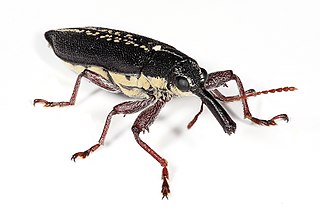
Belidae is a family of weevils, called belids or primitive weevils because they have straight antennae, unlike the "true weevils" or Curculionidae which have geniculate (elbowed) antennae. They are sometimes known as "cycad weevils", but this properly refers to a few species from the genera Parallocorynus and Rhopalotria.
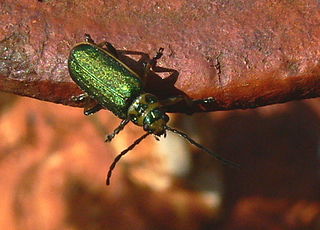
The Galerucinae are a large subfamily of the leaf beetles (Chrysomelidae), containing about 15,000 species in more than 1000 genera, of which about 500 genera and about 8000 species make up the flea beetle tribe Alticini.

The Orsodacnidae are a small family of leaf beetles, previously included as a subfamily within the Chrysomelidae. It is the smallest of the Chrysomeloid families in North America; Oxypeltidae is smaller, with only three species in South America. A fossil species of Aulacoscelis is known from the Early Cretaceous (Aptian-Albian) Santana Group of Brazil.
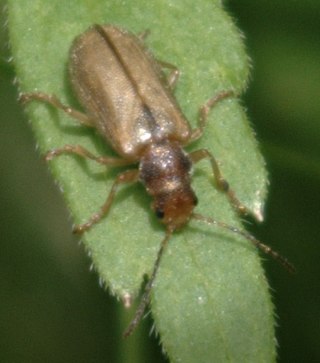
The Synetinae are a small subfamily within the leaf beetle family (Chrysomelidae). They are found entirely within the Holarctic, mainly in North America but also appearing in parts of Europe and Asia. The subfamily contains only two genera, Syneta and Thricolema, with a total of 12 described species. The group is sometimes treated as a tribe of Eumolpinae, where they are known as Synetini.
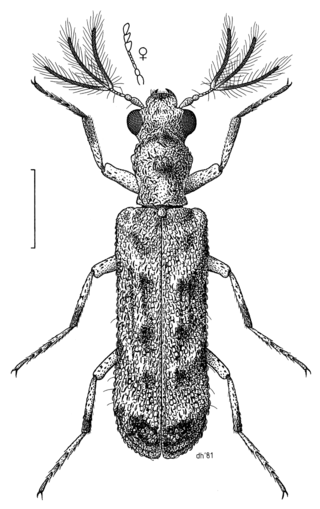
The Bostrichidae are a family of beetles with more than 700 described species. They are commonly called auger beetles, false powderpost beetles, or horned powderpost beetles. The head of most auger beetles cannot be seen from above, as it is downwardly directed and hidden by the thorax. Exceptions are the powderpost beetles, and members of the subfamily Psoinae.

Nemonychidae is a small family of weevils, placed within the primitive weevil group because they have straight rather than geniculate (elbowed) antennae. They are often called pine flower weevils. As in the Anthribidae, the labrum appears as a separate segment to the clypeus, and the maxillary palps are long and projecting. Nemonychidae have all ventrites free, while Anthribidae have ventrites 1-4 connate or partially fused. Nemonychidae lack lateral carinae on the pronotum, while these are usually present, though may be short, in Anthribidae.
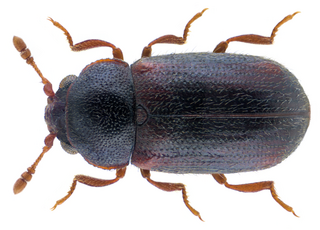
Sphindidae is a family of beetles, in the suborder Polyphaga. They are called slime mold beetles due to their exclusive feeding on slime molds during adult and larval stages, other aspects of their life history are obscure. Palaeontological discoveries since 2015 have added to the geologic history of Sphindidae, including the discovery of Libanopsis, placed in the extinct subfamily Libanopsinae.
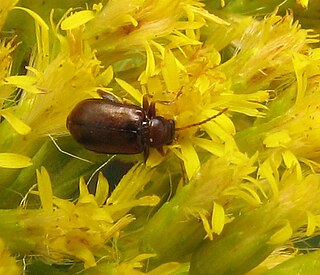
Luperaltica nigripalpis is a species of flea beetle in the family Chrysomelidae. It is found in North America.
Longitarsus melanurus is a species of flea beetle in the family Chrysomelidae. It is found in North America.

Kuschelina gibbitarsa is a species of flea beetle in the family Chrysomelidae. It is found in North America.
Systena marginalis, the margined systena, is a species of flea beetle in the family Chrysomelidae. It is found in North America.

Phyllotreta undulata, known generally as the small striped flea beetle or turnip flea beetle, is a species of flea beetle in the family Chrysomelidae. It is found in Australia, Europe and Northern Asia, North America, and Oceania.
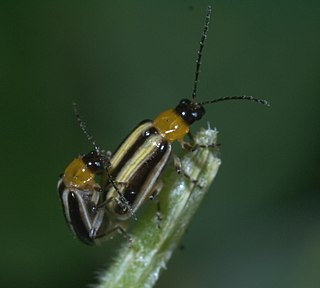
Luperini is a tribe of skeletonizing leaf beetles in the family Chrysomelidae. There are more than 30 genera and 500 described species in Luperini.

Orsodacne atra is a species of leaf beetle in the family Orsodacnidae. It is found in Central America and North America.

Orsodacne cerasi is a species of leaf beetle in the family Orsodacnidae.
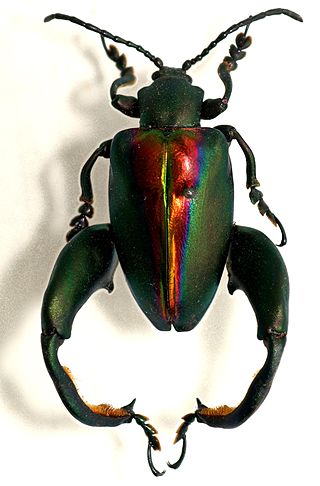
The Sagrinae are a subfamily of the leaf beetles, or Chrysomelidae.

Apoderinae is a subfamily of leaf rolling weevils in the beetle family Attelabidae. There are at least 20 genera and more than 650 described species in Apoderinae, found in Europe, Asia, and Africa.

















